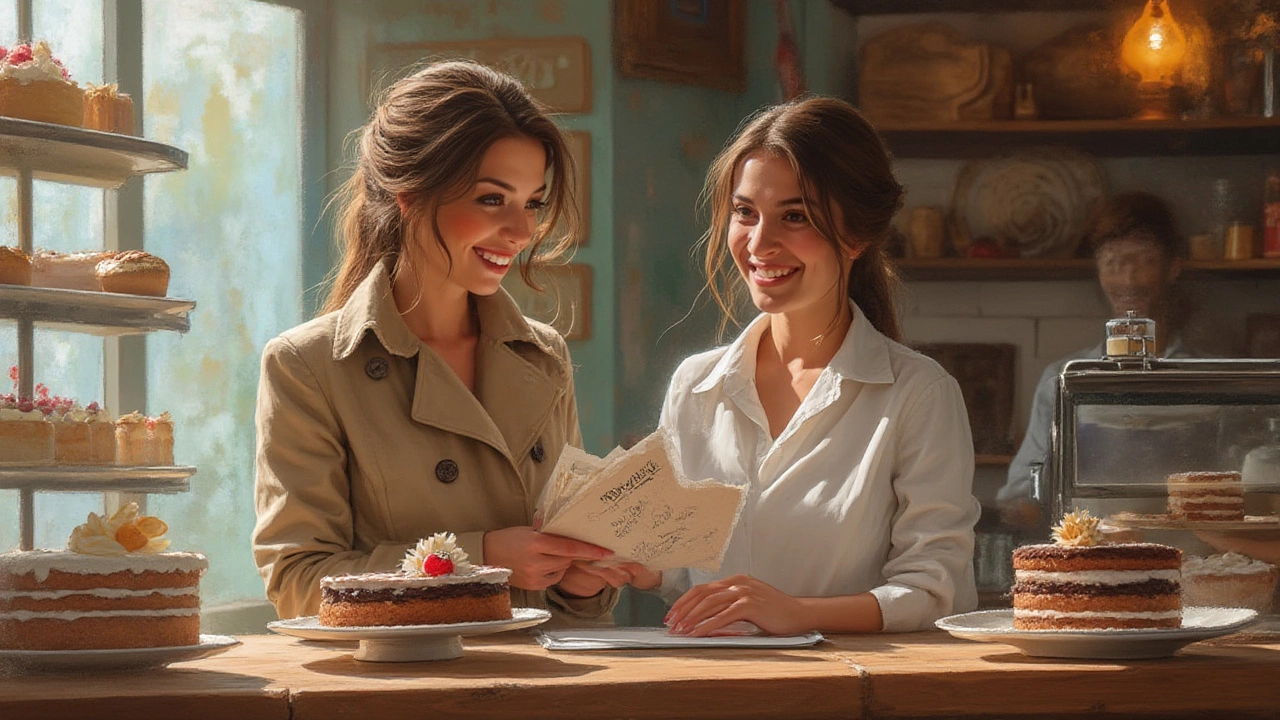
Most people hate the awkward moment when you finally find the perfect cake online—or smell one in a bakery—only to freeze up when it’s time to ask about the price. Maybe you worry the baker will take you for a time-waster or expect you to know the lingo. It can be weird, right? Here’s the thing: asking for cake prices is totally normal. Bakers want your business, and they’ve heard every question under the sun. But there are clever ways to get exactly the info you need for your celebration, whether it’s a birthday, wedding, or just a way to sweeten Tuesday.
Why Cake Prices Can Vary Wildly
If you’ve ever browsed cakes online, you know prices can swing from £20 all the way up to three or four digits. What gives? Part of it is that cakes are hardly ever one-size-fits-all. Everything impacts the price: the recipe, filling, design details, and even what day you need it. A “naked” sponge with jam is never going to cost as much as a four-tier showstopper with gold foil, sugar flowers, and hand-painted artwork. And while supermarket cakes have set prices on the shelf, most bakery cakes are bespoke. In Bristol, for example, you can easily pay £80 for a small custom cake, but if your heart is set on intricate fondant work, you might double—or triple—that.
Here’s something most people miss: ingredients matter. Want Belgian chocolate or Madagascan vanilla? Prices go up. Gluten-free or vegan options can bump costs by 20-30%. Then there’s labour. Some cakes take six hours to create, some need 40—and yes, you’re paying for the baker’s skills too. Lead time can be a factor. A last-minute 2-day request often gets charged a rush fee because the baker may have to squeeze you in or get ingredients in a hurry. And, less obvious, postcode can matter. Rents in places like Clifton are much higher than in Bedminster, which sometimes sneaks into the price.
If you’re curious how this looks, here’s a comparison of recent Bristol bakery quotes for a basic 8-inch round cake with simple decoration:
| Bakery | Base Cake (Sponge, Buttercream) | Custom Design | Vegan/Gluten Free | Lead Time Required |
|---|---|---|---|---|
| Lulu’s Cake Studio | £45 | +£25 | +£12 | 1 week |
| Cakecraft by Emma | £50 | +£20 | +£10 | 2 weeks |
| Bristol Bakeshop | £35 | +£18 | +£8 | 4 days |
See how many variables there are? No wonder it’s hard to spot a standard price tag. If you know why prices bounce around, you’ll feel more confident actually asking for the number—and spotting a good deal.
How to Start the Conversation (Without Blushing)
Forget the nerves—bakers don’t expect you to know how much your cake should cost. If you don’t ask, they can’t help! Start with a simple question, like: “Hi, could you tell me how much it would be for a cake like this?” Better yet, bring or send a photo. Visuals help bakers figure out work and ingredients, so you’re more likely to get an accurate quote quickly.
If you know your budget, just say so. “I’m planning a party for my daughter, my budget’s about £60—what options can you suggest?” That gives the baker a frame to work in. And don’t worry about offending with a low number; good bakers will explain what’s possible (and what isn’t) for what you have to spend.
Here’s a handy tip: ask what’s included. Some quotes are cake-only; others include basic decoration or a simple message. Want delivery or need structural supports for a big cake? Better to clarify now. If you prefer email to phone, you’ll have a written record of the conversation. Plus, some bakers respond after hours that way. Many even have enquiry forms where you can tick off your needs—so you don’t forget anything.
And if you’re contacting bakeries online, keep your message clear but friendly. For example:
- Share the date you need the cake
- Mention the number of servings you need
- Briefly describe the design or send a picture
- Flag any dietary restrictions
- Ask if there are delivery options
The more details you give, the faster you’ll get an accurate number. Most bakers genuinely want to help you get the best possible result, and the more you share up front, the less back-and-forth there’ll be.
What Questions to Ask About the Price
The worst thing is thinking you know what you’re paying for, then getting hit with a surprise fee later. So don’t be shy—it’s your wallet! Here are the main things to ask when you’re discussing cake prices:
- Is this the final price or are there extras (like special fillings, unique toppers, flowers, delivery, or custom decorations)?
- Does the price include taxes?
- How many slices does the cake serve (not all “8-inch” cakes serve the same number, especially with celebration portions)?
- Are there cheaper options for the same size (maybe a simpler design or different cake flavours)?
- How much is the deposit, and when is it due?
- What’s the cancellation/refund policy?
- When does final payment need to be made?
Amazingly, a lot of people are too polite to ask about all the little extras, but being direct is totally normal. Bakers prefer it—it saves headaches for everyone. An extra question: if you’re shopping around, let each bakery know. Some might price-match or suggest clever ways to trim the cost (maybe cupcakes instead of one big cake, or swapping fondant for buttercream).

Tips for Getting the Best Cake for Your Budget
Okay, let’s talk smart moves. If you want an amazing cake without spending your entire party budget, here are strategies that really work.
- Order early. Bakeries book up fast, especially for weekends and busy seasons (think May-July for weddings and September for parties). The more notice you give, the more choice you get—and some places offer discounts for early birds.
- Be flexible with flavours and fillings. Going for the most popular sponge or chocolate is almost always cheaper than specialty or imported ingredients.
- Simpler designs cost less. Naked cakes or ones with straight icing lines are gorgeous—and way less labour-intensive than elaborate fondant masterpieces. If you’re into trends, painted buttercream and pressed flowers often cost less but still look fantastic on Instagram.
- Ask about size. Sometimes, ordering a slightly smaller cake plus a tray of matching cupcakes serves the same crowd but costs less than a huge display cake.
- Collect quotes from at least two or three places. This gives you a real sense of the price range in your city. Be honest that you’re shopping around—bakers get it, and a little friendly competition can help you snag a deal.
- Look out for package deals. A few Bristol bakeries pair cakes with desserts like brownies, macarons, or fudge at a discount for large celebrations. You’ll bulk up your table and save a bit extra.
- Consider weekday pickups. Some shops offer quieter-day incentives or throw in a little extra decoration if you can collect at off-peak times.
And don’t forget, if someone else is paying (like for a wedding), ask if you can split cost with other guests, or even set up a group contribution—apps like PayPal or Monzo make that easy these days. The key is that gorgeous cakes don’t need to break the bank if you’re up front about your needs and budget.
How Bakeries Set Their Cake Prices
Bakers don’t just pluck numbers from thin air. There’s a method to the madness, and if you understand it, you’ll feel less in the dark about what you’re being quoted.
Here’s the lowdown: they start by calculating ingredient costs down to the gram. Eggs, butter, sugar—plus high-end extras like real fruit purees or edible gold. Next, they factor in time. Some bakers can decorate a simple cake in an hour; others take days for tiers, carving, and hand-painting. In Bristol, the typical hourly rate for cake artists ranges between £12-£25 an hour, depending on their skill and experience.
Then come the “overheads”: electricity, water, rent, packaging, even insurance. Add a little margin for profit, since bakers, just like anyone else, need to cover sick days and holidays. If a cake is especially tricky—gravity-defying tiers, for example—or for a special event like a wedding, additional charges appear for planning and consultation time. Here’s a glance at the main things influencing price:
- Ingredients (standard vs. premium, dietary modifications)
- Size (serves-how-many is the big question)
- Design complexity (3D characters or flowers versus classic swirls)
- Time (how many hours of work?)
- Rush or last-minute requests
- Delivery distance and setup (do they have to carry it across Bristol?)
Top tip: if you see a cake online with no price, it’s often because it was a custom job—designed just for the person who ordered it. That’s why providing clear details helps a baker nail down a real number for you, not just a guess.
Making the Most of Your Bakery Experience
At the end of the day, buying a cake is meant to be fun, not intimidating. If you’re polite, clear, and curious, you’ll come away with the info you need—and probably a few free cake-tasting samples if you pop into the shop. Don’t be embarrassed to mention you’re new to ordering cakes; bakers are used to first-timers, and most will walk you through options step by step.
Bring inspiration pictures, talk through your “must-haves,” and don’t let jargon trip you up. If the baker throws around words you don’t know—like “ganache crumb coat” or “dragees”—just ask. Most love the chance to explain. If you have allergies or special needs, flag them right from the start, so the baker knows to prevent cross-contact.
And hey, if the price turns out to be higher than you hoped, it’s okay to shop elsewhere. Bakers get it—everyone has a budget. Some even keep a list of trusted home bakers they’ll recommend if their own cakes are out of your range. It never hurts to ask about special offers, loyalty perks (lots of places in Bristol stamp your “cake card” for coffee mornings), or pop-up market days when slices are sold for less.
In the end, asking for cake prices doesn’t need to feel scary or uncomfortable. Armed with these tips, you’ll know what to ask, what to look for, and how to walk away with a cake—and a price—that really makes your celebration.